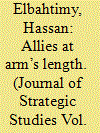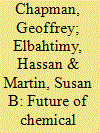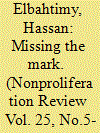| Srl | Item |
| 1 |
ID:
165094


|
|
|
|
|
| Summary/Abstract |
This article examines Egyptian–Soviet relations in the run up to the 1967 Arab–Israeli war. It argues that Egypt and the Soviet Union stumbled into brinkmanship with little coordination and no agreement on common objectives or goals. The article demonstrates how frustration and mutual disappointment were recurring features of the interactions between the two allies during the critical weeks prior to the war. In doing so, the article exposes new aspects of how Cairo and Moscow managed their alliance and assesses what that means to our understanding of the origins of this transformative war. These conclusions challenge revisionist accounts that attribute the start of the war to Egyptian–Soviet collusion and some traditional narratives that present the Soviet Union as an enterprising risk-taker invested in regional brinkmanship. The article draws heavily on Egyptian and Arabic language sources to examine Egyptian–Soviet interactions during this key period of Middle Eastern history.
|
|
|
|
|
|
|
|
|
|
|
|
|
|
|
|
| 2 |
ID:
163253


|
|
|
|
|
| Summary/Abstract |
With chemical weapons (CW) use in Syria raising questions about the health of the CW norm, this article analyzes whether the Syrian case will lead to further proliferation and use of chemical weapons by states. We examine the use of chemical weapons at Ghouta in 2013 and on the Hama Plains in 2014 and find that: first, chemical weapons have demonstrated limited military utility in Syria, either tactically or as a tool of civilian victimization; second, the costs of use have been repeatedly demonstrated by the international reaction to their use; and third, the use of sarin—a nerve agent—has attracted a stronger international response than the use of chlorine, a less lethal agent. Consequently, we conclude that the Syrian case is unlikely to lead to significant proliferation and use of chemical weapons; any that does occur is most likely to involve states already outside the CW norm.
|
|
|
|
|
|
|
|
|
|
|
|
|
|
|
|
| 3 |
ID:
167790


|
|
|
|
|
| Summary/Abstract |
Did nuclear considerations play an important role in the outbreak of the 1967 Arab-Israeli War? This research article seeks to answer this question by examining Egyptian decisions and conduct during the crisis preceding the war. The article argues that, despite long-standing Egyptian concerns over Israeli nuclear ambitions, the issue played only a marginal role in Egypt’s path to war. Egypt’s slide into war was a result of miscalculation rather than a deliberate plan to destroy Dimona. During the pre-war crisis, the nuclear dimension played only a minor role in Egyptian military planning. While a contingency plan to target Dimona was studied, it was never implemented. The article predominantly draws on Arabic-language sources, including first-hand accounts of Egyptian decision making during the pre-war crisis.
|
|
|
|
|
|
|
|
|
|
|
|
|
|
|
|